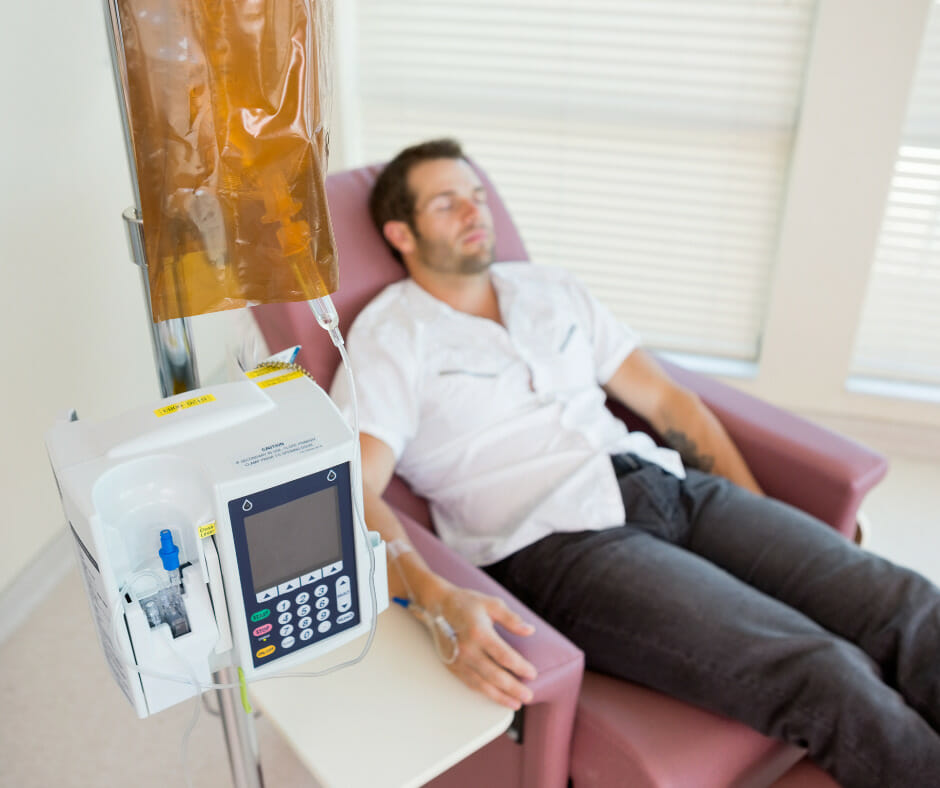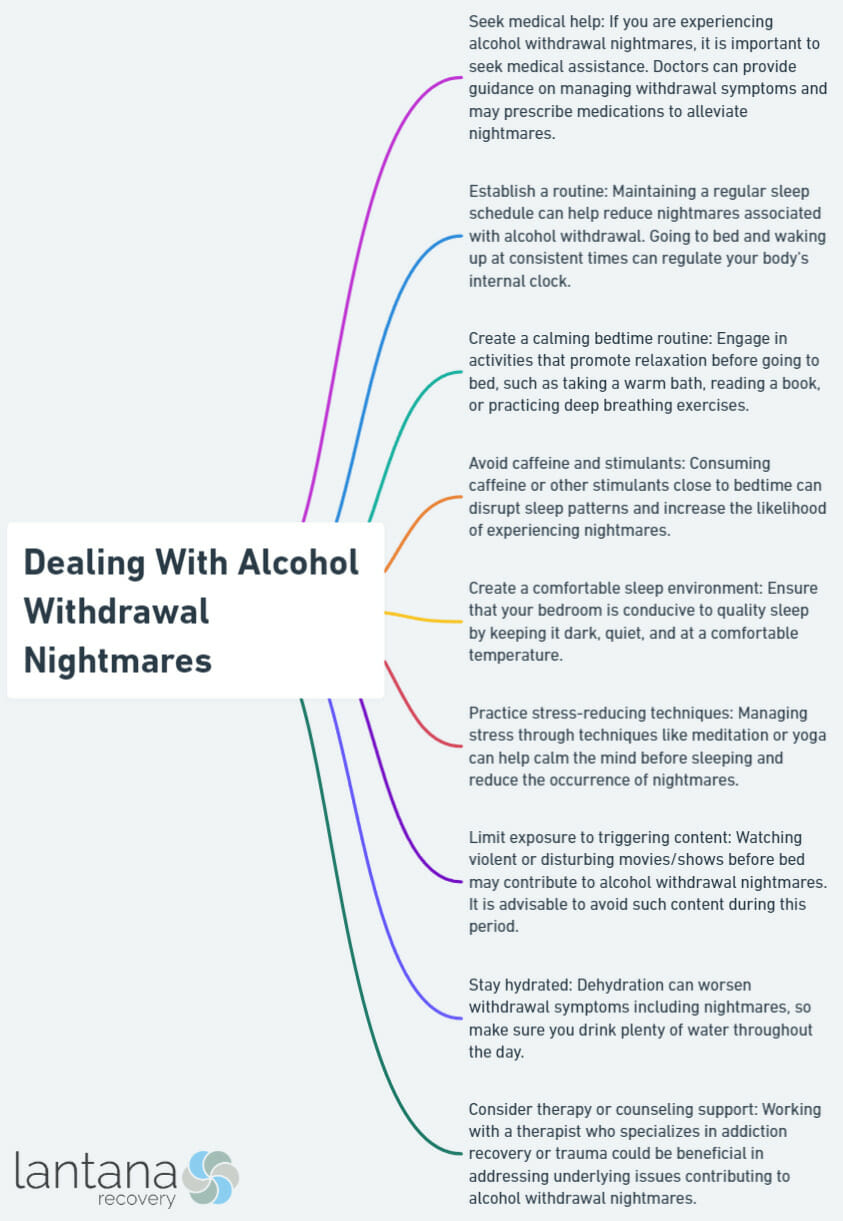Alcohol withdrawal nightmares are a common yet often overlooked aspect of the recovery process. Our goal is to shed light on this challenging experience and provide practical guidance for those who are seeking to overcome alcohol addiction. In this blog post, we will explore the science behind alcohol withdrawal nightmares, discuss the physical and psychological effects of withdrawal, and share strategies for managing these distressing sleep disturbances. Armed with this knowledge, you will be better equipped to face and conquer the nightmares that may accompany your journey to recovery.
Key Takeaways
- Understanding alcohol withdrawal nightmares involves recognizing the role of REM sleep and changes in brain chemistry.
- Professional support, lifestyle changes, medications, and therapies are essential for managing alcohol withdrawal symptoms including nightmares.
- Seeking help is necessary to reduce risks associated with untreated addiction and improve overall wellbeing.
Understanding Alcohol Withdrawal Nightmares

Nightmares are a frequent and distressing symptom of alcohol withdrawal. This occurs due to disruptions in the sleep cycle that happen when someone decides to quit drinking. As alcohol consumption affects the brain chemistry, it can lead to alterations in the sleep patterns, particularly REM (Rapid Eye Movement) sleep, which is responsible for vivid dreams and nightmares.
The connection between alcohol withdrawal and nightmares can be largely explained by two factors: the role of REM sleep and the changes in brain chemistry during withdrawal. These factors contribute to a phenomenon called REM rebound, which triggers vivid dreams, nightmares, and even night terrors.
Addressing alcohol withdrawal nightmares is a crucial part of the recovery process as they can amplify anxiety and negatively affect physical and psychological health.
The Role of REM Sleep in Nightmares

Alcohol withdrawal disrupts REM sleep, one of the deepest stages of the sleep cycle, characterized by rapid eye movement, increased brain activity, and vivid dreaming. REM sleep typically constitutes approximately 20% of total sleep. When someone quits drinking, they may experience an irregular REM cycle known as REM rebound. This can result in vivid nightmares and sleep disruption due to alcohol withdrawal.
It generally takes 1-2 weeks for the sleep cycle to regain balance after quitting alcohol. During this period, the REM rebound can lead to longer and more intense REM sleep, which can be accompanied by vivid dreams and nightmares. This process may also affect the deep sleep stage, which is crucial for physical restoration.
Comprehending the role of REM sleep in alcohol withdrawal nightmares assists individuals in coping better with this challenging aspect of recovery.
Brain Chemistry Changes During Withdrawal
As we mentioned earlier, alcohol withdrawal is associated with changes in brain chemistry. Studies have shown that drinking alcohol increases the amount of GABA receptors available for the brain to use, which in turn decreases the transmission of messages between other neurotransmitters and suppresses various functions within the body. This is why alcohol is considered a central nervous system depressant.
The brain attempts to rectify these chemical imbalances during alcohol withdrawal, which often leads to sleep disturbances and nightmares. The alterations in brain chemistry directly contribute to these sleep disruptions, which is why seeking alcohol withdrawal treatment is crucial to mitigate their effects and ensure a successful recovery.
Physical and Psychological Effects of Alcohol Withdrawal

Alcohol withdrawal can manifest in various physical and psychological symptoms. Physical symptoms may include tremors, sweating, and nausea, while psychological symptoms can involve anxiety, irritability, and depression. These symptoms are the result of the brain working to correct the chemical imbalances caused by quitting alcohol.
Abstaining from alcohol or deciding to quit can also result in nightmares and other withdrawal symptoms. Being aware of these potential side effects and seeking professional help when necessary is crucial, as untreated withdrawal symptoms can severely impact one’s overall well-being.
Common Withdrawal Symptoms
Typical symptoms of alcohol withdrawal include elevated blood pressure, psychological disturbances, anxiety, headaches, and nightmares. The specific symptoms that someone experiences may vary depending on the substance being withdrawn from, but some common symptoms include anxiety, restlessness, irritability, nausea, sweating, insomnia, headaches, muscle aches, tremors, and stomach pain in alcohol withdrawal.
These withdrawal symptoms can have a significant impact on sleep and overall well-being. Some common symptoms include:
- Insomnia
- Nightmares
- Anxiety
- Depression
- Irritability
- Fatigue
These symptoms can affect one’s ability to function during the day and impede progress in recovery. Addressing and managing these symptoms is a vital part of the recovery process.
The Impact of Nightmares on Recovery
Nightmares can play a substantial role in the recovery process, particularly for those with trauma-related nightmares that may occur during REM sleep. These nightmares can be intense and distressing, interfering with sleep and leading to feelings of fear and anxiety. This can make it challenging to fully recover from trauma or addiction, as the fear of having nightmares can have a detrimental effect on daytime functioning.
Managing nightmares is an integral part of the recovery process, as the lack of restful sleep increases the risk of relapse. According to a Norwegian study published in journal Addiction Research and Theory, “60% of alcohol patients who had insomnia prior to treatment relapsed in the five months following treatment, versus 30% of those without insomnia.” (Persistent sleep problems among people in recovery from substance use disorders: a mixed methods study, Erga et al., 2022) Various strategies for managing alcohol withdrawal nightmares, including medical and non-medical interventions, will be discussed in the following sections.
Strategies for Managing Alcohol Withdrawal Nightmares

There are several ways to manage alcohol withdrawal nightmares, including:
- Seeking professional assistance for access to medications and therapies that can help reduce the intensity and frequency of nightmares
- Making lifestyle changes, such as improving sleep hygiene and avoiding triggers that may contribute to nightmares
- Practicing relaxation techniques, such as deep breathing exercises or meditation, to promote better sleep and reduce anxiety
Obtaining professional assistance for alcohol cessation can also offer support and guidance in managing the psychological and emotional consequences of alcohol withdrawal.
Relaxation techniques that can be beneficial in reducing stress and anxiety, and may help lessen the intensity and frequency of nightmares during alcohol withdrawal, include:
- Deep breathing
- Progressive muscle relaxation
- Guided imagery
- Mindfulness meditation
The following sections will further explore the medical and non-medical approaches to managing alcohol withdrawal nightmares.
Medical Support for Withdrawal Symptoms
Medication and medical supervision can play a crucial role in managing beer withdrawal symptoms, including nightmares. For example, benzodiazepines may be prescribed on a short-term basis to help address some of the symptoms of insomnia.
In more severe cases, psychotropic medication may be utilized for the treatment of highly intensive nightmares related to Post-traumatic Stress Disorder.
Consulting with a healthcare professional or addiction specialist is pivotal in determining the best course of action for managing alcohol withdrawal symptoms. These professionals can help ensure that the appropriate medications and therapies are utilized to address the specific needs of the individual.
Non-Medical Approaches to Improving Sleep
Aside from medical interventions, there are various non-medical approaches that can be helpful in improving sleep during alcohol withdrawal. Good sleep hygiene, which involves implementing healthy bedtime practices, can enhance the quality and regularity of sleep. This may include maintaining a consistent sleep schedule, creating a relaxing bedtime environment, and avoiding stimulants such as caffeine and alcohol before bedtime.
Lifestyle changes and relaxation techniques can also be effective in reducing sleep disturbances and nightmares during withdrawal. These methods may include:
- Engaging in regular exercise
- Practicing relaxation techniques such as deep breathing and progressive muscle relaxation
- Seeking emotional support from family, friends, or support groups.
Alcohol Addiction Treatment Options

When it comes to overcoming alcohol addiction, there are several options available, including detoxification and ongoing support for long-term recovery. Detoxification is an essential first step in the alcohol addiction treatment process, as it helps rid the body of all alcohol and drug remnants, allowing recovery to commence. Medical supervision during detox is crucial to ensure the safety and comfort of the individual undergoing the process, making it easier for them to quit alcohol.
After the detox phase, ongoing support and therapy play a vital role in maintaining sobriety and preventing relapse. This can involve:
- Counseling
- Therapy sessions
- Support groups
- Other forms of support tailored to the individual’s requirements
The importance of detoxification and medical supervision, along with the role of ongoing support and therapy in alcohol addiction treatment, will be discussed in the following sections.
Detoxification and Medical Supervision
Detoxification is a critical component of alcohol addiction recovery, as it allows the body to eliminate all traces of alcohol and drugs. The detox process can be challenging due to alcohol withdrawal symptoms. On average, it lasts around one week. Medical staff at an addiction treatment facility can assist clients in managing withdrawal symptoms through the administration of medication.
It is advised to detox within a specialized facility that provides around-the-clock supervision and care. This ensures that the individual can safely navigate the withdrawal process and receive the necessary support to manage any complications that may arise, such as delirium tremens or other severe withdrawal symptoms.
Ongoing Support and Therapy
Ongoing support and therapy are integral components of recovery, enabling individuals to address underlying issues and avert relapse. Services such as:
- Counseling
- Therapy sessions
- Support groups
- Other forms of support tailored to the individual’s needs
Participating in support groups can help individuals maintain their sobriety and continue working towards a healthier, addiction-free life, while addressing substance abuse issues.
The advantages of sustained support and therapy include:
- Addressing fundamental issues
- Forestalling recurrence
- Building a strong foundation for long-term recovery
- Developing necessary coping skills
By engaging in ongoing support and therapy, individuals can build a strong foundation for long-term recovery and develop the necessary skills to cope with the challenges that may arise along their journey to sobriety.
Recognizing the Signs of Delirium Tremens

Delirium tremens (DTs) are a serious and potentially life-threatening form of alcohol withdrawal. Recognizing the symptoms of delirium fever is crucial, as this severe condition requires immediate medical attention. Symptoms of DTs include disorientation, tremors, and seizures.
The following sections will guide you on how to identify the signs of delirium, along with preventive measures and treatments available for this condition.
Identifying Delirium Tremens Symptoms
The symptoms associated with delirium symptoms may include:
- Tremors or shaking of the hands and feet
- Chest pain
- Confusion
- Prolonged sleep
- Dehydration
- Agitation or hallucinations
Failure to treat delirium symptoms can be life-threatening and potentially fatal. Being vigilant for these symptoms is crucial, as timely intervention is key to ensuring the safety and well-being of the individual experiencing them.
Fact: In 2013, a research studying the medical records of patients with DT hospitalized at the Psychiatric Clinic in Serbia between 2002 and 2011 reported that early intervention can reduce the risk of Delirium Tremens to less than 5%.
If you or someone you know is experiencing any of the above symptoms, it is vital to seek immediate medical attention. Timely intervention and treatment can help prevent severe complications and improve the chances of a successful recovery.
Preventing and Treating Delirium Tremens
Preventing delirium symptoms involves:
- Abstaining from alcohol
- Seeking treatment for alcohol use disorder
- Providing appropriate fluid-electrolyte support and continuous monitoring of vital signs
- Resting
- Avoiding intense physical activity
- Staying hydrated
These are important factors to consider.
Medical treatment options for delirium symptoms include:
- Benzodiazepines to reduce agitation and seizures
- Supportive care such as fluids and electrolytes to prevent dehydration
- In severe cases, antipsychotic medications may be prescribed to reduce hallucinations
Prompt treatment and preventive measures can help ensure a safer and smoother recovery process for those experiencing delirium symptoms.
The Importance of Seeking Help for Alcohol Abuse

Seeking help for alcohol abuse is of paramount importance, as untreated addiction can result in serious long-term health consequences and negatively impact various aspects of one’s life. Professional assistance, such as the services provided by Renaissance Recovery and the Discovery Institute, can provide comprehensive support and treatment options tailored to the individual’s needs.
By seeking help for alcohol addiction, individuals can minimize the risks associated with untreated addiction and work towards a healthier, addiction-free life. The risks of untreated alcohol addiction and guidance on finding the right treatment program will be discussed in the following sections.
Risks of Untreated Alcohol Addiction
Untreated alcohol addiction can result in severe health complications, including liver failure, heart attack, stroke, and even death. It can also cause social issues, including relationship problems, financial hardships, and legal issues. The physical effects of alcohol addiction can include liver damage, heart disease, and an increased risk of certain types of cancer, while psychological effects can include depression, anxiety, and difficulty concentrating.
By seeking assistance for alcohol addiction, individuals can:
- Reduce the risks associated with alcohol addiction
- Improve their overall well-being
- Diminish the physical and psychological consequences of alcohol addiction
- Address any underlying issues that may contribute to the addiction
Treatment can help achieve these goals and provide support throughout the recovery process.
Finding the Right Treatment Program
Selecting the right treatment program for alcohol addiction is crucial to ensure a successful recovery. Factors to consider when choosing a program include the severity of the addiction, the location of the treatment facility, and individual preferences. Consulting with a healthcare professional or addiction specialist can help determine the best course of action for the individual’s specific situation.
Treatment options available include evidence-based outpatient programs for alcohol use disorder, medication-assisted treatment, and comprehensive aftercare support. By finding the right treatment program, individuals can receive the support and guidance they need to overcome their addiction and work towards a healthier, addiction-free life.

Summary
In conclusion, alcohol withdrawal nightmares are a challenging but manageable aspect of the recovery process. Understanding the connection between alcohol withdrawal and nightmares, as well as the role of REM sleep and brain chemistry changes, can help individuals better cope with this distressing symptom. By seeking professional help, implementing lifestyle changes, and engaging in relaxation techniques, individuals can alleviate the impact of alcohol withdrawal nightmares on their recovery. Remember, with the right support and resources, overcoming alcohol addiction and achieving lasting sobriety is possible.
Frequently Asked Questions
When you stop drinking do you get nightmares?
For some people going through withdrawal, vivid dreams or nightmares may occur.
A program designed to ease withdrawal symptoms can help with these issues.
Can detoxing cause nightmares?
Going through withdrawal can bring on vivid dreams and nightmares, but a professional detox program can help reduce their intensity.
Detox programs provide a safe and supportive environment for individuals to manage their withdrawal symptoms. They are staffed with medical professionals who can provide medication and other treatments to help ease the process. Detox programs also work.
Can alcohol abuse cause night terrors?
Yes, chronic alcohol abuse can cause night terrors due to disruption of normal sleep cycle and development of sleep disorder.









